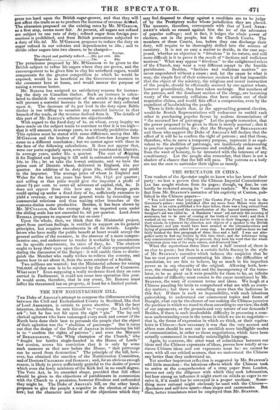THE NEW NONINTRUSION BILL.
THE Duke of ARGYLE'S attempt to compose the differences existing between the Civil and Ecclesiastical Courts in Scotland, like that of Lord ABERDEEN, is certain to prove abortive. With the best intention, doubtless, he sets himself to " cooper the Lord's holy ark "; but he has not hit upon the right " pin." The lay and clerical agitators who have rummaged every nook and corner of the North have done their best to persuade the people that the object of their agitation was the " abolition of patronage." But it turns out that the design of the Duke of ARGYLE in introducing his bill is to "confirm the rights of patrons "; and even the Marquis of BREADALBANE, " the Whig champion of the Church," who " fought her battles single-handed in the House of Lords " last session, avows his conviction that it is only by some such measure as that now before the House, " that patronage can be saved from destruction." The principle of the bill, how- ever, has obtained the sanction of the Nonintrusiou Committee, and of Doctors CHALMERS and GORDON ; and, for an obvious enough reason, is likely to prove sufficiently grateful to the desire of power which even the lowly ministers of the Kirk feel in no small degree. The Veto Act, in its amended shape, provided that full effect should be given to the objections of parishioners in communion with the Church to a presentee, however frivolous and unfounded they might be. The Duke of ARGYLE'S bill, on the other hand, proposes to give the people a negative in the election of minis- ters; but the character and force of the objections which they may feel disposed to charge against a candidate are to be judge of by the Presbytery under whose juriscliction they are placed. The measure, therefore, corresponds with that of Lord ABBE. DE EN'S which so roused against him the ire of the advocates of popular suffrage; and in fact, it lodges the whole power of election, not in the people, but in the Church Courts. The members of these Courts, too, before they can discharge their duty, will require to be thoroughly drilled into the science of casuistry. It is not so easy a matter to decide, in the case sup- posed, whether an objection is "frivolous " in its nature, and still more difficult is it to prove it the result of " factious and malicious motives." What may appear " frivolous " to the enlightened rulers of the Church, may wear a very different aspect to the humble parishioner. Besides, " factious and malicious motives " are never engendered without a cause ; and, let the cause be what it may, the simple fact of their existence renders it all but impossible that the object of the ministry, the religious and moral instruction of the people, should be effectually secured by one against whom, however groundlessly, they have taken umbrage. But numbers of the patrons, and the dominant section of the clergy, are becoming weary of the unseemly collisions that have arisen out of their respective claims, and would fain effect a compromise, even by the expedient of hoodwinking the people.
There is little doubt that, at the approaching general election, would-be Scotch Representatives will endeavour to outbid each other in purchasing popular favour by zealous denunciations of " the accursed law of patronage." Let the people remember, that the power proposed to be given to them is merely nominal ; . ;hat it is not worth contending for ; that the Martinis of BREADALBANE and those who support the Duke of ARGYLE s bill declare that the effect of it will be to confirm the right of patrons ; and that those, therefore, who, to serve a temporary purpose, represent it as equi- valent to the abolition of patronage, are insidiously endeavouring to practise upon popular ignorance and credulity, and are not fit, from the want of honesty, to be intrusted with the interests of any constituency. Let the people also remember, that there is not a shadow of a chance that the bill will pass. The patrons as a body are not the men to surrender their rights so tamely.


























 Previous page
Previous page